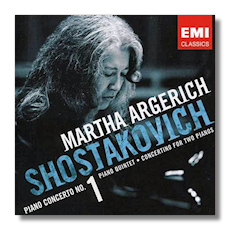
The Internet's Premier Classical Music Source
Related Links
- Shostakovich Reviews
- Latest Reviews
- More Reviews
-
By Composer
-
Collections
DVD & Blu-ray
Books
Concert Reviews
Articles/Interviews
Software
Audio
Search Amazon
Recommended Links
Site News
 CD Review
CD Review
Dmitri Shostakovich

Argerich Plays Shostakovich
- Concerto #1 for Piano, Trumpet & Strings, Op. 35 1
- Concertino for 2 Pianos, Op. 94 2
- Quintet for Piano & Strings, Op. 57 3
1-3 Martha Argerich, piano
1 Sergei Nakariakov, trumpet
2 Lilya Zilberstein, piano
3 Renaud Capuçon & Alissa Margulis, violins
3 Lida Chen, viola
3 Mischa Maisky, cello
1 Orchestra della Svizzera Italiana/Alexander Vedernikov
EMI Classics 504504-2 DDD 66:21
This, I believe, is Argerich's first all-Shostakovich CD, although it is not her first "official" recording of Shostakovich's First Piano Concerto. These are live recordings from the 2006 Lugano Festival, and part of the so-called "Progetto Martha Argerich" in which musicians – many of them quite a bit younger than Argerich – are invited to collaborate with Argerich and with each other in performances of chamber music. EMI's recordings from these occasions have been unfailingly successful, and this one is no exception. In other words, Argerich repeatedly proves herself to be not just a remarkable pianist, but also a canny artistic director.
The wonderful thing about Argerich's playing – one of the many wonderful things, I should say – is that it retains its bright colors and singing line, even when the music she is playing isn't explicitly Romantic in style. It is tempting to harden one's tone in Shostakovich's piano works, and to make them sound either steely or just brittle. That's how many pianists play them, particularly the Russians. On the other hand, I don't think that Argerich could make these works sound monochromatic or ugly if she tried. Still, one can't accuse her of watering-down their emotional content either. Beauty, after all, can knock you in your solar plexus.
The First Piano Concerto can be played for laughs, or it can be turned into an extended manic episode. Argerich and friends play it brilliantly and with great intensity, and they really play up some of its satirical elements, particularly in the last movement. Argerich's precision is a given, but it is her warmth and her color that prevent this concerto from sounding as coarse as it sometimes does. Russian trumpet virtuoso Nakariakov follows suit, supplying brilliance without brittleness. He is recorded very far forward, however.
The ten-minute Concertino for two pianos is an oddity. (At any rate, I've never encountered it before.) Shostakovich wrote it in 1954 to be performed by him and his son Maxim. Like the Second Piano Concerto from 1957, it is a "public" work, and immediately likeable, without any apparent kowtowing to the demands of the Communist Party or any secret messages. (As Freud is supposed to have said, "Sometimes a cigar is just a cigar.") Argerich and Zilberstein play it zestfully, and the music is fresh and sometimes even blissful.
Deeper emotions are raised in the popular Piano Quintet from 1940. This is a work that encourages performers to pull out buckets of hard, gun-metal gray tone, just to be sure that we understand how much Shostakovich suffered as an artist and as a man. While not forgetting Shostakovich's dark side, Argerich and friends don't bash us over the head with angst. This is a fun (yes, fun) performance that has a lot of color and sensitivity, and everyone plays gorgeously, not just the pianist. I'll be pulling this CD down from the shelves a lot.
The live recordings are bright and very immediate. There is a much applause and crazy cheering after the first two works – it sounds as if people had fun – and more respectful applause after the Quintet.
Copyright © 2008 by Raymond Tuttle




















